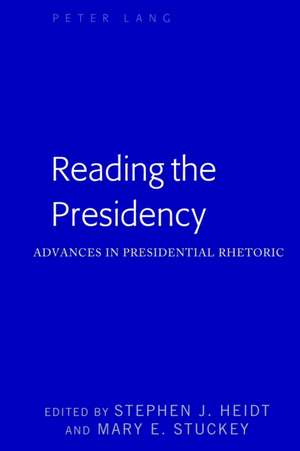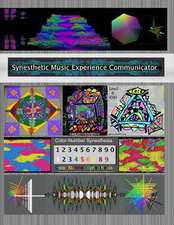Reading the Presidency: Frontiers in Political Communication
en Limba Engleză Paperback – 29 ian 2019
| Toate formatele și edițiile | Preț | Express |
|---|---|---|
| Paperback (1) | 468.24 lei 6-8 săpt. | |
| Peter Lang Copyright AG – 29 ian 2019 | 468.24 lei 6-8 săpt. | |
| Hardback (1) | 1068.67 lei 6-8 săpt. | |
| Peter Lang Copyright AG – 27 dec 2018 | 1068.67 lei 6-8 săpt. |
Din seria Frontiers in Political Communication
- 23%
 Preț: 441.66 lei
Preț: 441.66 lei - 23%
 Preț: 444.93 lei
Preț: 444.93 lei - 8%
 Preț: 557.74 lei
Preț: 557.74 lei -
 Preț: 537.79 lei
Preț: 537.79 lei -
 Preț: 372.08 lei
Preț: 372.08 lei -
 Preț: 299.89 lei
Preț: 299.89 lei -
 Preț: 442.59 lei
Preț: 442.59 lei -
 Preț: 329.32 lei
Preț: 329.32 lei -
 Preț: 406.22 lei
Preț: 406.22 lei -
 Preț: 415.53 lei
Preț: 415.53 lei -
 Preț: 497.33 lei
Preț: 497.33 lei -
 Preț: 494.24 lei
Preț: 494.24 lei - 23%
 Preț: 504.96 lei
Preț: 504.96 lei -
 Preț: 342.46 lei
Preț: 342.46 lei -
 Preț: 275.70 lei
Preț: 275.70 lei - 27%
 Preț: 672.60 lei
Preț: 672.60 lei - 23%
 Preț: 656.18 lei
Preț: 656.18 lei - 27%
 Preț: 757.11 lei
Preț: 757.11 lei -
 Preț: 255.00 lei
Preț: 255.00 lei -
 Preț: 359.42 lei
Preț: 359.42 lei -
 Preț: 375.94 lei
Preț: 375.94 lei -
 Preț: 390.79 lei
Preț: 390.79 lei -
 Preț: 380.73 lei
Preț: 380.73 lei - 27%
 Preț: 955.13 lei
Preț: 955.13 lei -
 Preț: 338.50 lei
Preț: 338.50 lei -
 Preț: 408.88 lei
Preț: 408.88 lei -
 Preț: 388.45 lei
Preț: 388.45 lei - 27%
 Preț: 1068.64 lei
Preț: 1068.64 lei -
 Preț: 382.89 lei
Preț: 382.89 lei - 23%
 Preț: 972.63 lei
Preț: 972.63 lei
Preț: 468.24 lei
Preț vechi: 585.29 lei
-20% Nou
89.61€ • 93.21$ • 73.98£
Carte tipărită la comandă
Livrare economică 14-28 aprilie
Specificații
ISBN-10: 1433166062
Pagini: 348
Dimensiuni: 151 x 226 x 23 mm
Greutate: 0.5 kg
Ediția:Nouă
Editura: Peter Lang Copyright AG
Seria Frontiers in Political Communication
Notă biografică
Cuprins
Acknowledgments - Stephen J. Heidt: Introduction: The Study of Presidential Rhetoric in Uncertain Times: Thoughts on Theory and Praxis - Section One: Reading the President through Institutions - Timothy Barney: Cartographer-in-Chief: Maps in Televisual Addresses and the Cold War President as Geographic Educator - Allison M. Prasch: Reading the Presidency In Situ: Obama in Cuba and the Significance of Place in U.S. Presidential Public Address - Milene Ortega/Mary E. Stuckey: The Other Presidential Rhetoric: Rhetorical Mobilization within the White House - Ryan Neville-Shepard: Genre-Busting: Campaign Speech Genres and the Rhetoric of Political Outsiders - Jay P. Childers/Cassandra C. Bird: The Rise of Comforter-in-Chief: Presidential Responses to Violence Since Reagan - Section Two: Reading the Presidency through Interactions - Ronald Walter Greene/Jay Alexander Frank: Obama's Command: Chemical Weapons in Syria and the Global Duties of a Rhetorical Presidency - Blake Abbott: Unpresidented: Articulating the Presidency in the Age of Trump - Stephen J. Heidt/Damien Smith Pfister: Trump, Twitter, and the Microdiatribe: The Short Circuits of Networked Presidential Public Address - Leah Ceccarelli: Pioneers, Prophets, and Profligates: George W. Bush's Presidential Interaction with Science - Belinda A. Stillion Southard: Negotiating the Limits of a Multiparty Democracy: Michelle Bachelet's Rhetoric of Commitment - Section Three: Reading the Presidency through Interruptions - Paul Johnson: The Debt Ceiling Debacle: Presidentialism as Cruel Optimism - Joel M. Lemuel: The Discursive Antecedents to Richard Nixon's War on Drugs - Leslie J. Harris: Home-Making, Nation-Making: American Womanhood in Progressive Era Presidential Rhetoric - Lisa Corrigan: White "Honky" Liberals, Rhetorical Disidentification, and Black Power during the Johnson Administration - David Zarefsky: Afterword: Reflections on Rhetoric and the Presidency - About the Contributors.

























